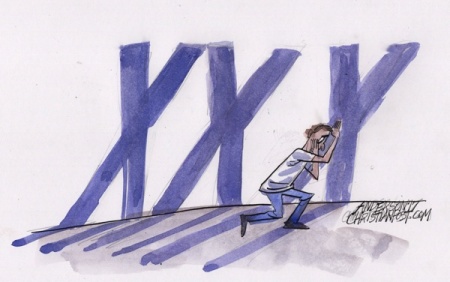The #MeToo Movement Ignores an Obvious Source of Sexual Aggression: Porn

Unless you have lived in a cave with no connection to the traditional or social media, it has been impossible to escape the chronic, provocative and apparently unending reach of the #MeToo campaign. A day rarely goes by in the news cycle when a man, prominent in business, media or entertainment, is not accused of some level of sexual misconduct, from suggestions of a grope at a party decades ago to the mind-boggling series of allegations that now define the life and career of former Hollywood mega-producer and liberal elite Harvey Weinstein. These revelations rarely, if ever, find their origin in the criminal justice system; the recipients of these charges are rarely formally charged with breaking any law and might never see the interior of a courtroom.
Nonetheless, he will probably lose his job, his reputation and perhaps his family in the process—innocent or guilty.
How are we to assess this steady stream of shameful revelations and the #MeToo movement as Christians? Should we be applauding the apparent exposure of these men as acts approaching righteous indignation? Should we be decrying the persistence of a male sexual aggression that clearly defies biblical morality?
I would suggest we should approach the allegations with caution. But we should also examine a pernicious source of sexual misanthropy in our sexually-charged society: the continued explosion of unrelenting pornography from a sordid industry that profits from the dehumanization of both men and women.
But first to the issue of guilt. The #MeToo movement relies almost exclusively on social media gossip. The allegations may well be true, but of course we often will never know for certain because there is no neutral forum to verify the information—the media reports that follow the initial tweets on Twitter or posts on Facebook are generally mere rewrites of the initial reports. Of course a denial of guilt from the accused might be inserted into the story, but what does this really mean when we have become accustomed to ignoring such disclaimers? Careers, reputations and families are being destroyed in this process of communicating these allegations—careers and lives that may never be fully restored or completely rehabilitated even if the stories eventually are proven to be false.
That being said, the rash of sexual misconduct reports have forced us all to recognize the pervasiveness of sexual aggression in our society, and yet we are apparently no closer to examining, assessing or condemning an obvious culprit in the proliferation of that sexual aggression: pornography.
So many of the sexual assault scenarios that have been described in the media sound like scenes out of pornographic films, where, of course, this kind of behavior is not defined as assault but normalcy. This is precisely the fundamental problem with porn: it not only over-sexualizes our world, it also attempts to convince us that our world is one where overt sexual aggression is not only tolerated but encouraged. Pornography not only debases both its purveyors and the consumers, it also preaches a sexual narrative that is not only unhealthy but dangerously at odds with reality. When men are seduced into believing the pornographic lie—that the spontaneous expression of any sexual whim is acceptable—they are acting out an illusion that in reality is abusive and in fact often illegal.
Pornography long ago ceased to be mere entertainment—albeit entertainment of the most destructive and base sort. Pornography is a political and philosophical message emitted from the lowest echelons of disordered desires: it tells us to satisfy any sexual craving—no matter how strange, how sick or how unhealthy—because there will be no consequences. It is a message that is so ubiquitous in this internet age that it is difficult to ignore.
Pornographic culture is now invading our popular culture, infecting so much of our television viewing, reading material and advertising. If we just focus on television, mainstream dramas often include relatively graphic depictions of sexual activity that would have been considered fit only for a "stag" film in decades past. The internet has made pornography far more accessible and more anonymous than it ever was in the magazine and X-rated film age of yesteryear. What's more, pornographic "values" have now become such a big part of mainstream entertainment and sexual mores that it is no longer something perverts have to seek out—even the morally upright have to guard against being inadvertently exposed to porn from a miss-typed word in a Google search or a graphic sex scene inserted into an otherwise decent movie.
If we are to honestly examine physical sexual abuse in our society, we need to acknowledge the most blatant and obvious form of virtual sexual abuse: unrestricted, unrelenting pornography that dehumanizes men and women and leads to an increase in sexually aggressive behavior.
Originally posted at the Family Research Council.
David Krayden is the Ottawa Bureau Chief for The Daily Caller. He is a former Air Force public affairs officer and communications specialist for the Canadian Parliament.





















